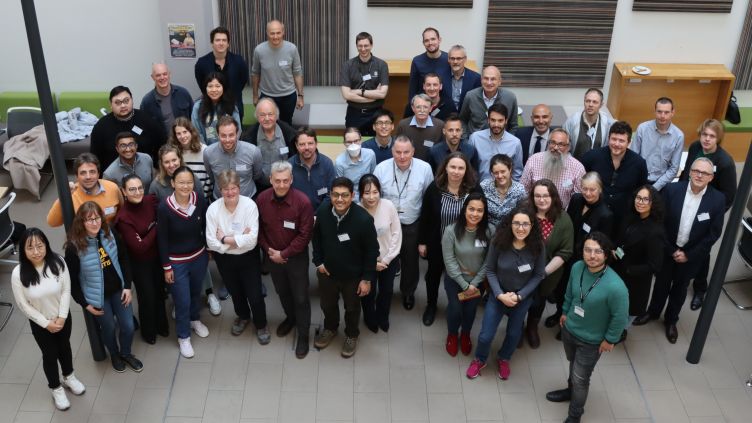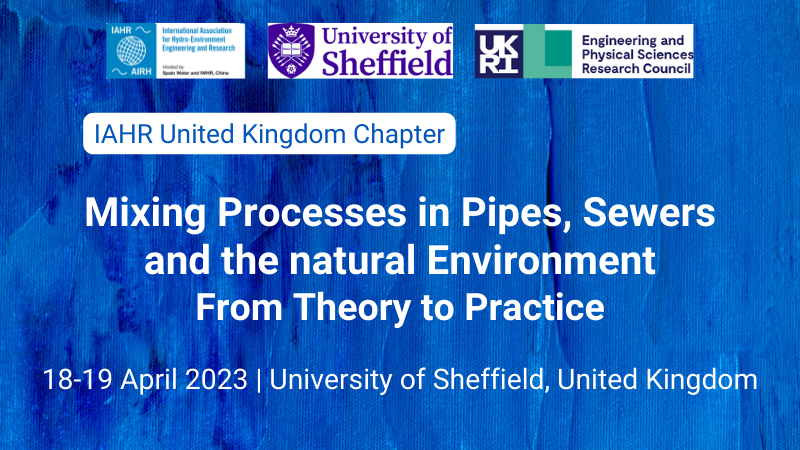Report Workshop on Mixing processes in pipes, sewers and the natural environment from theory to practice
This two-day workshop organised by the IAHR United Kingdom National Chapter presented recent international research findings, and practical implications, of mixing processes of soluble materials across a range of different water environments.

Attendees to the Mixing Processes in Pipes, Sewers & the Natural Environment from Theory to Practice workshop
Hosted at the University of Sheffield on 18th & 19th April 2023, and supported by the EPSRC (EP/P012027/1), this workshop was organised by Professor Ian Guymer to bring together researchers, environmental regulators, engineering consultants and water utilities, to hear the latest international research on mixing processes. The workshop was a great success with over 50 people attending the in-person talks each day.
Predicting water quality processes, together with their human and ecological impact, is a major challenge and requires an understanding of mixing processes. In total, 22 presentations from 10 countries, were delivered, highlighting recent advances, and generating robust discussions. Day 1 focussed on mixing in pipes and urban drainage systems, whilst talks on day 2 focussed on environmental flows. Breaks between presentations fostered several useful discussions about the many challenges facing the water industry. At the end of each day, attendees were invited to view the University of Sheffield’s water laboratory facilities.
The presentation slides and presentation recordings are available online:
Programme
18 April 2023 | Pipe flow and Urban Drainage
Session 1 - Chair Professor Ian Guymer
Longitudinal Dispersion in Pipes for Steady and Unsteady Flows
Dr James Hart, Coventry University, UK
Quantifying Cross-sectional Concentrations in Accelerating Flows
Dr Zhangjie Peng, University of Sheffield, UK
A Novel EPANET Integration for the Diffusive–Dispersive Transport of Tracers
Dr Stefania Piazza, University of Kore, Italy
Session 2 - Chair Professor Gabriele Freni
Modelling Longitudinal Dispersion in Premise Plumbing – is it needed?
Professor Steve Buchberger, University of Cincinnati, USA
EPA's Research into Premise Plumbing Systems, Dispersion, and Applications
Dr Jonathan Burkhardt and Dr Feng Shang, US Environmental Protection Agency, USA
Applications to managing distribution networks
Dr Mirjam Blokker, KWR Water, Netherlands
Session 3 - Chair Dr Ole Mark
Advection-Diffusion Solver Suitable for Fluid Circulation in Drilling
Dr Johnny Petersen, formerly IRIS, Norway
Manhole Mixing and Modelling
Dr Fred Sonnenwald, University of Sheffield, UK
Sewer Modelling for Wastewater-based Epidemiology
Mr Joe Shuttleworth, Arup, UK
Session 4 - Chair Professor Virginia Stovin
Travel time for in sewer treatment
Dr Ole Mark, Kruger, Denmark
Non-invasive Measuring System for the Dynamics of FOG Deposits
Professor Francois Clemens, TU Delft, Netherlands
Reception in the Heartspace E Floor Atrium
Opportunity to visit the unsteady pipe flow laboratory facility
19 April 2023 | Environmental flows
Session 1 - Chair Professor Ian Guymer
Quantifying the Spatial Variation in Cross-shore Mixing in the Surf Zone
Ms Inez Plugge Porter, Imperial College, UK
In-situ assessment of hydraulic roughness in a vegetated channel
Professor Jean Lacoursière, EA-International Ltd, Sweden
The Spatial Routing Procedure for Estimation of Dispersion Coefficient
Dr Inhwan Park, Seoul National University of Science and Technology, South Korea
Session 2 - Chair Dr Alan Cuthbertson
Influence of Vegetation on Pond Residence Times
Professor Ian Guymer, University of Sheffield, UK
CFD Study of Mixing within Random Cylinder Arrays
Professor Virginia Stovin, University of Sheffield, UK
Characterization of Hydrodynamics and Mixing Processes in Obstructed Flows
Dr Leo Corredor Garcia, University of Sheffield, UK
Session 3 - Chair Professor Mick Whelan
Transverse dispersion in a compound channel
Dr Kevin Spence, Sheffield Hallam University, UK
Longitudinal dispersion affected by willow patches
Dr Kaisa Västilä, Aalto University, Finland
Influence of vegetation coverage on mixing in the reach scale
Dr Monika Kalinowska, Polish Academy of Sciences, Poland
Session 4 - Chair Professor Jean Lacoursière
Integrated monitoring of water quality and water quantity
Dr Jungsun Oh, Korea Institute of Civil Engineering & Building Technology, South Korea
Point Source Contaminant Exposure and Impacts
Professor Mick Whelan, University of Leicester, UK
Workshop end
Opportunity to visit the RandoSticks laboratory facility
